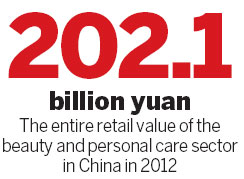A survey of the global retail market released by the consulting firm A.T. Kearney showed China moved up from sixth place in 2011 to third place in 2012. It predicted the growth rate of China's retail sales revenue will double by the end of this year despite rising labor costs and rents.
The German retail and wholesale group Metro AG opened 12 new stores in China last year to bring the total number to 64. It plans to have about 100 stores by 2015. Wal-Mart Stores Inc opened 30 new stores in China last year. Carrefour S.A. opened 18. Tesco Plc opened 13. Auchan S.A. opened 10.
|
Sales of cheaper cosmetics, such as lipsticks, haven't been affected much by the slowing-down economic growth. L'Oreal Group, for example, saw its market share in China grow 11.2 percent in 2012 from 10.8 percent a year earlier. [Li Bin / For China Daily] |
Zara, a leader in the fast fashion industry, opened 31 more stores in China in 2012 to bring the total number to 123. Uniqlo Co, an overseas fast fashion brand in China, opened 71 more stores in China in 2012, bringing the total number to 184 by the end of last year.

Conversely, luxury brands saw their growth slow down in China in 2012 after years of astonishingly rapid rises in sales. According to the US consulting firm Bain & Co, the growth rate in the Chinese luxury market fell to 7 percent in 2012 from 30 percent in 2011.
Italian brand Gucci said at the beginning of this year it would maintain the opening of new stores in China at three to four a year. At its height it was opening 10 to 15 stores annually. Bernard Arnault, chairman and CEO of luxury brand LVMH, said on Jan 31 that Louis Vuitton will not open boutiques in second- and third-tier cities in China in an attempt to avoid over-exposure.
According to Nick Debnam, Asia-Pacific chairman of consumer markets at KPMG China, the lipstick effect is an economic phenomenon where even when luxury spending slows, the spending on cosmetics tends to hold up pretty well. Cosmetics are relatively affordable compared with other luxury items and while people delay their bigger ticket luxury purchases, for cosmetics there is less deferral, or "switching of buying habits".
People are less likely to stop buying fast-moving consumer goods because they are seen as daily necessities. Debnam added that it does not necessarily mean the money saved by not buying luxury goods will be transferred to the purchase of daily necessities.
He added when the economy declines, some people will start to buy "relatively less expensive lipsticks or makeup to make themselves feel good".
But he said he witnessed an improvement in the situation in the latter part of last year with sales gradually returning to normal, especially in Hong Kong. In the Chinese mainland market, he said things will get better probably in the second half of this year.
It's not just cosmetics involved in the lipstick factor. It includes movies, as witnessed by the popularity of Charlie Chaplin films during the Great Depression in the US in the 1930s.
According to the former State Administration of Radio Film and Television, China's box office sales hit 17.07 billion yuan ($2.74 billion) in 2012, surging 30.18 percent year-on-year and making the country the world's second-largest movie market.
The low-budget comedy Lost in Thailand, which debuted on Dec 12, took an unprecedented 1.2 billion yuan in less than one month, out-earning Avatar and Transformers: Dark of the Moon to become the highest-grossing movie ever shown in Chinese theaters.
"Imagine how much a young guy has to pay for a two-hour date, including dinner, shopping and everything else. Check out the labels of whatever brand in the department store. A sweater will cost as much as 1,000 yuan. A Prada bag will cost the guy about 10,000 yuan if he really wants to give his girlfriend a special gift. The date can be very expensive," said Liang Wei, founder and president of Beijing Magilm Pictures which specializes in marketing movies and is the largest company of its kind in China.
"But he can pay around 100 yuan for two for a movie, which can last around two hours. Time is killed easily and cheaply," he said.
Of course, there are many more options for recreation in first-tier cities such as Beijing, be it dining out or drinking with friends or singing karaoke. However, Liang said they all "require a certain mood to make sure everything is right".
"In cities, going to the movies is the easiest and cheapest pastime. Over time, Chinese audiences, especially younger ones, have developed the habit of regularly going to see movies," he added.
According to research conducted by his company, regular movie-goers, who watch films in theaters at least once a month, numbered 80 million in 2011. Box office receipts in China soared in 2012 partly because people went to the cinema as much as three times a month.
The market is expanding. In January 2012, the daily number of showings of films was 40,000. The number almost doubled in January this year, reaching 75,000.
"The capacity of the market has expanded. It is the same as supermarkets. If you can find a supermarket on your way to work, the amount you spend in the store will increase," said Liang.
